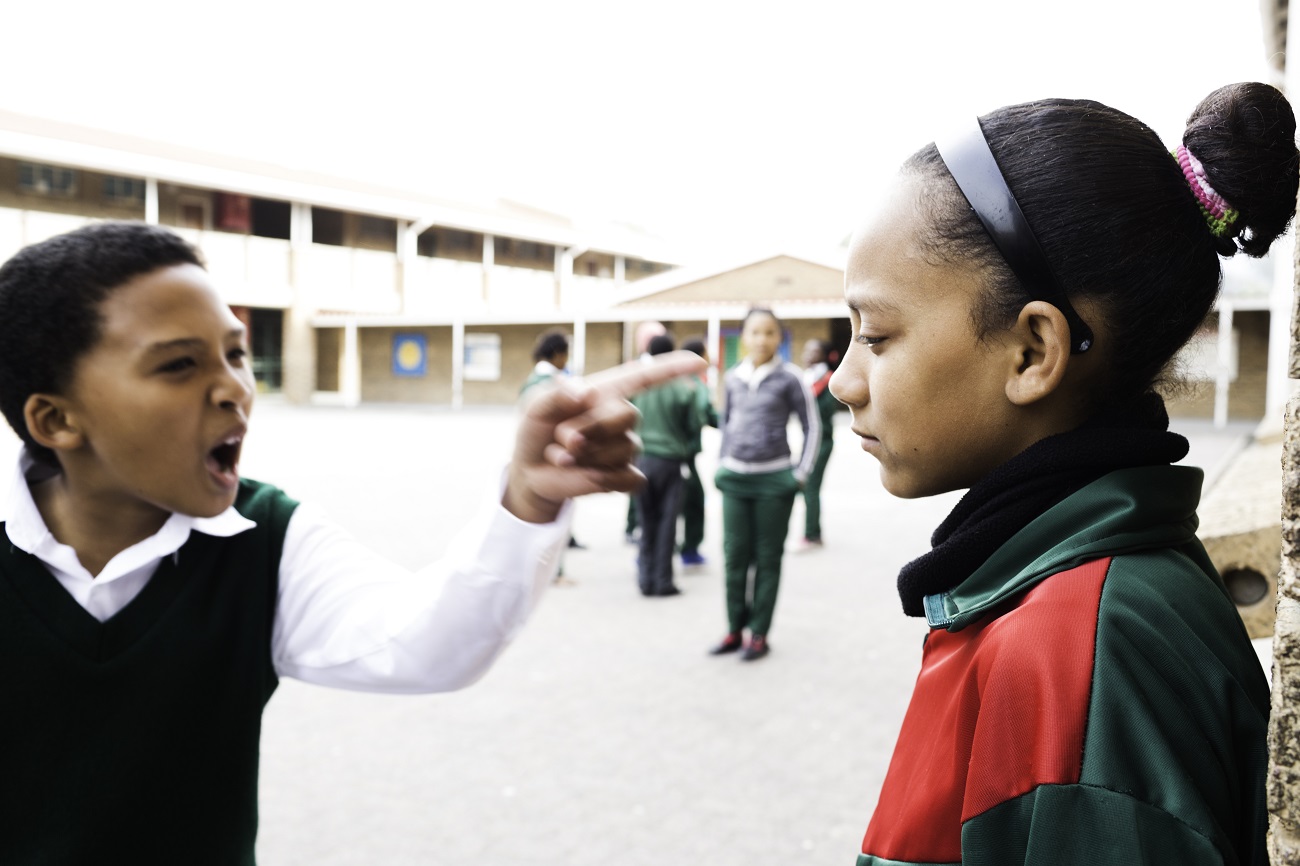
Discovering that your child is a bully can be unsettling because the thought of them harming others is troubling. However, you need to help them take responsibility for their actions and encourage them to change their behaviour. Fundiswa Nkwanyana shares how.
“I noticed that my son kept coming back home from school with unexplainable toys, sweets and money,” says Lebo Nkosi, a mother to a 10-year-old boy. When he kept lying about where and how he got these things, Lebo met with officials at the school and learnt that her son was a bully. After speaking to his son and teacher, she also learnt that other kids were teasing him because he was taller and bigger. But, he was using the wrong way to defend himself; he decided to fight back physically, and eventually became the bully himself. “I told him to report the kids to his teachers and me, and that together we would help him deal with the bullies,” Lebo explains. When it comes to bullying, the focus is usually on helping the victim while the bully is often punished without investigating the reason for their behaviour. “There needs to be a strong focus on helping the bully because a bullying child is not necessarily bad; they have just adopted bad behaviour. And, it is not reflective of who they are. Through remedial action, this behaviour can be changed,” says psychologist Tracy Smith.
SEE ALSO: Sibling rivalry- when to get involved
REASONS BEHIND THE BULLYING
When most parents find out that their child is the bully, they are quick to make assumptions, become defensive and blame them and the school. “I have been working with children for over 20 years, and have noticed that bullies often suffer from emotional and mental distress. Bullying is their way of coping,” says Sarah Mtshali, a primary school teacher. Before taking any action, first find out why your child is the bully as this will help you find a productive way forward together. “In a calm and loving tone, ask your child why they bully others,” Sarah advises. Children shut down when they are scolded. In order for you to hear what they have to say, you need to remain composed. Here are some of the reasons why Sarah believes that children become bullies:
- Children that are exposed to aggressive behaviour and violence at home are likely to repeat these actions.
- Sometimes, bullies are teased or ostracised by their peers, and therefore retaliate by bullying.
- Children with a low self-esteem usually want to feel important and powerful; bullying can give them that feeling.
- Most bullies torment others because they don’t get love or attention at home or school.
- Some bullies do not understand how their behaviour is affecting their victims.
- Children who were once bullied can become bullies in order to protect themselves, and regain their power.
- Some children misunderstand the meaning of standing up for themselves, and unknowingly become bullies.
- When kids are rejected by their peers, they can become bullies because they fear being alone.
- Having parents that do not enforce discipline can also make a child a bully because they know that there will be no consequences for their actions.
IS YOUR CHILD A BULLY?
Having a close relationship with your child will help you notice when something is not right. In Lebo’s case, she was able to act quickly after noticing the signs. Tracy says parents and teachers are often the first people to notice the signs, but quick to ignore them. However, if you suspect any odd behaviour in your child, act fast and trust your instincts. “You need to pay close attention to the way in which your child talks and plays with others. You also have to check whether they make fun of or are aggressive towards others, and the reasons behind their school detention,” she adds. As a parent, you have the most influence on your child, and are vital in shaping their emotional and mental wellness.
SEE ALSO: Discipline your child the right way
A HELPING HAND
Many parents panic or are quick to scold and punish their child. This does not necessarily help to correct bad behaviour. “Bullying needs to be addressed immediately. Your child needs to realise that their behaviour is unacceptable and that they will be disciplined,” says Tracy. Most children do not understand the depth of bullying, so parents need to make them understand. In order to find the correct plan of discipline, you also need to stress the importance of healthy friendships as well as resisting peer pressure. Your child has to know that no matter the reason behind the bullying, it is still a choice, and that they are responsible for their actions. “You also need to support the school’s discipline action and not rescue your child from it,” adds Tracy. Once you know the cause, have helped your child to understand why their behaviour is unacceptable and disciplined them, you now need to teach them new skills to prevent them from bullying others again. “Don’t shame your child as a form of discipline as this teaches them that it is acceptable to do the same to others. Rather monitor the situation and keep the lines of communication open,” advises Sarah.
STAY CONNECTED
Cyberbulling is also on the rise, and you can use the above-mentioned plan of action to help your child stop this. “Whether it’s physical, verbal or online bullying, parents should deal with it in the same way,” Tracy says. Having a close and open relationship with your child can help to prevent them from harming others. “Your child needs to be able to talk to you about whatever they are going through. And, for this to happen, you need to spend more time with them in order to build a strong and loving relationship,” concludes Tracy.




